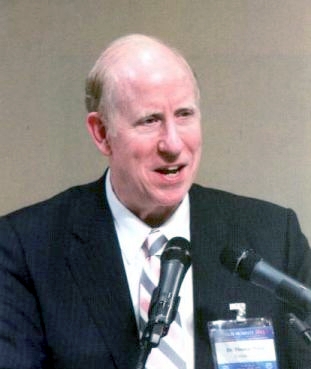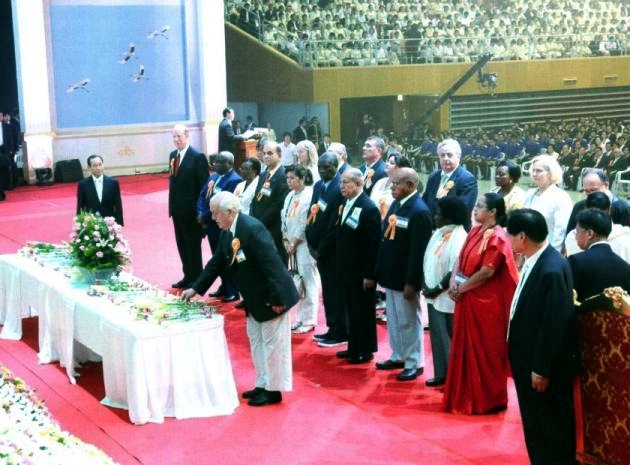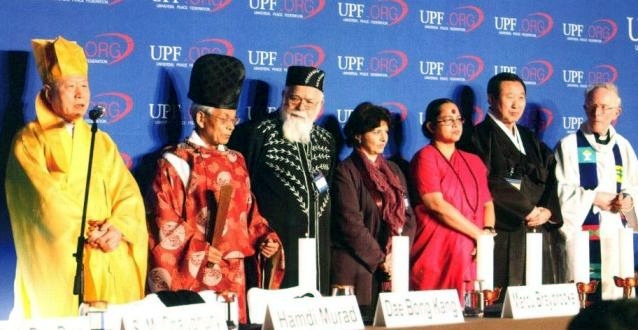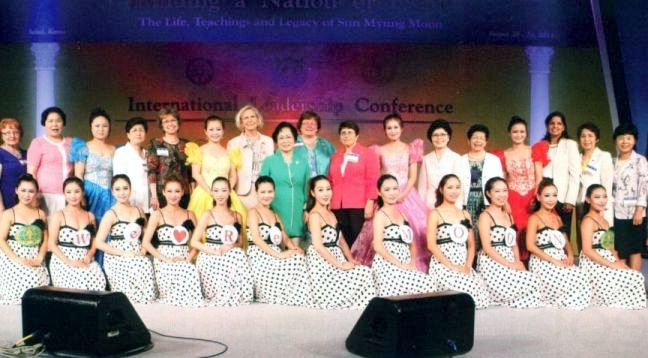![]()
The Words of the Walsh Family
|
|
The Words of the Walsh Family |

At the core of True Father's life and mission is education. To educate is to lead, guide and cultivate the heart and mind of individuals and groups to ever-higher levels of knowledge, understanding, insight and wisdom. The core content to be passed on to others through education varies, depending on the subject matter. A lecture on physics will contain content that is different from that in a lecture on psychology. Likewise, a course designed for graduate students will vary significantly from a course designed for high school students. In other words, the subject matter and the audience profile are important in education.
Over the years, True Father taught in a wide variety of contexts, on various topics and to widely different audiences. For example, he taught UTS students how to make and mend fishing nets and of the importance of the ocean in God's providence, Nobel Prize winners' about the importance of absolute values and the unity of the sciences, members of the clergy about the true meaning of the crucifixion of Jesus, and leaders at the United Nations of the need for the UN to establish an inter-religious council, in order for that institution to be able to fulfill its noble mission to "end the scourge of war."
When True Parents founded the Inter-religious and International Federation for World Peace (the precursor to UPF) in 1999, IIFWP immediately convened a series of Hoon Dok Hae conferences in Washington D.C. These conferences were designed to focus on reading from Father's teachings. They convened these conferences on almost a monthly basis, bringing usually three high-level leaders from each nation around the world, one religious leader, one political leader and one media leader. These conferences formed the basis for what came to be the Ambassador for Peace initiative, namely a global network of leaders from all fields, religions, races and cultures that have responded affirmatively to True Parents' core vision and teachings.
When True Parents, on the foundation of IIFWP, established the Universal Peace Federation, they immediately launched their most ambitious world speaking tours. Together they travelled to one nation per day to share God's word, God's truth, and the holy blessing to the world. The entire True Family participated throughout 2005 and 2006. The schedule was relentless. As True Father said, he was making this tour "at the risk of his life."
UPF's International Leadership Conference series builds on this foundation. At a deeper level, the ILC curriculum builds on the tripartite structure of Divine Principle: Creation, Fall, Restoration. Thus, the curriculum first of all seeks to offer a general exposition of the following content: God's nature and God's heart; God's original ideal as expressed in the three blessings; the subject -- object relations and give and take action that underlie the nature of all things; and the interplay between the physical world and the spiritual world.
Secondly, the curriculum introduces the essential teachings about the Fall, explaining how, according to Principle, a world that was intended by God to be so good could turn out so horribly bad, rife with injustice, conflict and selfishness. Emphasis is placed on the misuse of love and the breakdown of filial piety in the first family, leading not only to the separation between God and Adam and Eve but also to the murder of Abel by his older brother Cain.
And, finally, the curriculum addresses the principles of restoration; in effect, the foundation of faith and the foundation of substance, providing biblical and historical examples such as the Jacob and Esau story or Father's own return to North Korea to meet Kim 11-sung. Given the focus of UPF on peace, this aspect of the Principle is especially important insofar as it provides an opportunity to illuminate the tragic and often destructive dynamics of the Cain -- Abel relationship and offers "best practices" aimed at resolving Cain -- Abel disunity or conflict.
Additional presentations are also given, as time permits, on topics such as "The Significance of Marriage, Family and the Blessing" or "The Significance of Spirituality for Good Leadership" or "Spiritual Principles and Good Governance." An introductory overview of Father's life and the mission of the True Parents caps off the curriculum.
Based on the introductory presentations described above, the ILC shifts to what may be called "application"; that is, the application of the Principle to real world situations. In this respect, we can then speak about the various programs of UPF or other providential organizations within our movement. These application presentations focus on six core areas of UPF's work: Interfaith Peace Building, Marriage and Family, Peace and Security; Character Education and Service Learning; United Nations Relations; and Leadership and Good Governance.
It is not always possible to cover each of these areas in depth during an ILC. Sometimes a broad summary is all that may be possible. For the purposes of this article, I will provide some background on a few of the areas that are usually covered.

Members
of the UPF family, Unificationists and others, pay their respects to
True Father on the anniversary of his ascension.
Interfaith Peace Building
For those grounded in a monotheistic vision of one God, all human beings share a common origin. Just as all human beings are members of one global family, so too are the religions. Each religion represents the effort on the part of God and on the part of human beings to unite in accordance with ultimate truth and wisdom. All religions share this aspiration. True Parents have great love for all religions, since the religions represent the effort on the part of God's sons and daughters to practice filial piety and to return to the original ideal and the original homeland.
For many centuries, religions could exist in relative isolation from one another, viewing each other with suspicion and distrust, born not simply of ignorance and fear, but of a desire to remain true to what each believes to be God's will and God's truth. In the twenty-first century, the situation of religion has changed dramatically, owing in part to the growing proximity of religions to one another within the "global village" and to the immediacy and pervasiveness of communication. No religion, and no ethnic group can live any longer is relative isolation. The fact of cultural, religious and ethnic pluralism is staring us all in the face.
In this context, religions are required to acknowledge one another and in the best-case scenario move along a spectrum from acknowledgement to tolerance, to dialogue, to mutual understanding, to mutual respect, to mutual appreciation and on to cooperation. Increasingly, those who engage in this process are exposed to transformative insights, leading some to develop hybrid religious identities, attributed to a growing appreciation not only of their "mother religion" but also of their "adopted religion."
True Parents led the way in the twentieth century in rekindling an interfaith activism, the genealogy of which includes HSA-UWC's effort to "unify Christianity," the essence of ecumenism, the formation of the Unification Theological Seminary, with its interfaith faculty, and a host of inter-religious initiatives, such as the New Ecumenical Research Association, with its God Conference series; Youth Seminars on World Religions, the International Religious Foundation, the Assemblies of the World's Religions, the Council for the World's Religions, the Religious Youth Service, and the Inter-Religious Federation for World Peace.
The investment in interfaith relations by True Parents is unsurpassed. Furthermore, it is intrinsic to the Divine Principle. That is, to be a Unificationist or to be a member of FFWPU requires one to be open, loving, encouraging, respectful and in dialogue and cooperation with believers from other faiths.
Moreover, in the quest for peace, in the quest to realize God's ideal, and in the quest to realize God's kingdom and to establish Cheon Ii Guk, the religions are absolutely necessary as guides, as partners and as allies. For example, when True Parents developed the vision for the International Highway Project (ICUS, 1982), Father indicated that each religion should work to raise the funds needed for the project. When True Parents spoke at the UN in August 2000, the primary message, rooted in the vision of the Inter-religious and International Federation for World Peace, was for the United Nations to establish an interfaith council as an "upper house" or "senate" within the UN system. Peace among the nations can only be achieved on the foundation of peace among religions.
World Scripture, initiated at the Assembly of the World's Religions (1985) powerfully illustrates True Parents' appreciation of the universal principles found in the world's religions.
Those of you who have not taken time to read World Scripture and the Teachings of Sun Myung Moon, as part of your daily Hoon Dok Hae are missing out on a vast treasure of content that illustrates not only the common ground upon which religions stand but the magnificent wisdom and power of True Father's teachings.
The hospitality which True Parents have demonstrated time and time again toward religions should not be confused with syncretism, theological relativism or a muddled view that all religious ideas are equal, as in some facile multiculturalist perspective. True Parents' position is clear and the truth of the Divine Principle is clear. However, these ultimate truths need not be communicated in a simplistic supersessionist or triumphalist way; that is, we should avoid emulating patterns that have been at the core of inter-religious polemics and conflict over millennia. An older brother must teach with respect, compassion and wisdom in order to be effective. This is an ideal that UPF tries to achieve.
The relationship among religions can be fostered best if we avoid seeing other religions as competitors to be defeated by superior content. Religious learning and religious growing involve the whole person in a dialogical and relational process. Uttering doctrinal statements is only one part of that relationship. This is as true among believers within the religious traditions as it is between believers from different religions.
With this in mind, True Parents' teachings are presented with an awareness of the audience as being religiously diverse. In other words, the audience may either be unfamiliar with biblical texts or, even if familiar with these texts, not ready to accept them as normative or especially compelling. For this reason, we often draw upon sacred texts from various religions in order to underscore the theological points made in the Divine Principle or in Father's speeches.

Leaders
from a variety of faiths light a candle and pray at the International
Leadership Conference. Engendering cooperation between religions is a
core component of UPF's mission.
Marriage and Family
From its inception, UPF (and prior to that, IIFWP and other predecessor organizations of our movement) has consistently underscored the centrality of marriage and family as the key to peace, and the center of love, life and lineage. In addition, the blessing has not only been affirmed but encouraged, and practiced. Along with instruction about purity and fidelity, Holy Wine Ceremonies, blessing education and participation in the Blessing Ceremony have always, always been part of UPF educational programs.
Usually, in an International Leadership Conference, we have a presentation entitled "The Significance of Marriage, Family and the Blessing." This presentation covers such topics as the Fall, the Four Great Realms of Heart, the importance of purity prior to marriage, and fidelity within marriage, emphasizing that the family is the primary school of love and peace. An overview of the history of the Blessing Ceremonies, beginning in 1960, is also presented. In all the Blessing Ceremonies that have taken place since UPF was founded, Ambassadors for Peace have participated. In many nations around the world, Blessing Ceremonies for Ambassadors for Peace have been performed.
While it may be true that the level of the internal guidance, the education, or the level of comprehension on the part of the participants is at times incomplete or inadequate, one might argue that this has always been the case. Few blessed central couples, looking back, would say that they fully understood the theological, spiritual and social significance of their blessing.

WFWP
took part in the recent UPF International Leadership Conference. In
the front row are the Pyongyang Folk Arts Group, comprising refugees
from North Korea.
Peace and Security
Most of the work of UPF fits under the category of "soft power" approaches to peace. Soft power is contrasted with conventional "hard power" approaches to peace that rely on some form of coercion; that is, getting someone to do what you want them do by threat of either military or economic force. Soft power tries to get someone to do what you want them to do by means of persuasion or, as is often said, "moving hearts and minds." Appeals to dialogue, education, interfaith cooperation, service to others in order to build trust, etc., are examples of the use of soft power.
While UPF is fundamentally committed to soft power approaches to peace, we also recognize that the world we live in operates according to the traditional system of the nation-state where national sovereignty and national security interests are protected by the threat of military and economic power. Few, if any governments will trust that matters of national security can be addressed adequately by appeal to the good will and altruism of other nation-states, especially not to enemy states.
Given the general distrust, a distrust that is not based simply on imaginary fears, but rather real world experience, the soft power approach is relegated to a subordinate status in global affairs. It is valued, but it stands in a supporting role and its voice is often drowned out by the roar of fighter jets overhead.
In light of these circumstances, it is important for soft- power advocates to be fully aware of hard-power realities. For example, it is doubtful that the war in Syria is going to be solved any time soon by an appeal to interfaith dialogue, cross-cultural marriage or by the pleas of Pope Francis for all sides to put down their weapons. As true as the claims are, that if we only would truly practice our religions, or intermarry across enemy lines, their application is not a short-term solution. Hence, hard power prevails for the most part.
UPF's efforts in the area of peace and security are primarily in the area of promoting understanding and analysis of both the complex geopolitical realities and the complexity of finding sustainable solutions.
Conclusion
The International Leadership Conferences initiated by UPF, but consistent with efforts by many of True Parents' other organizations over many decades are designed to share, inform, and inspire many colleagues, associates and allies, known more recently as Ambassadors for Peace, about True Parents' vision, teachings and achievements.
As stated earlier, education needs to be tailored to the audience. While True Father spoke always the truth and the Principle, he also was a master of speaking to every conceivable audience in ways that seemed to fit the situation and context. He always seemed to know the kind of content, the degree of content and way of presenting the content to various audiences.
Many of those who are educated in an ILC have not been deeply searching for new truth. They are most often highly placed professionals who are already married and who are already committed to a spiritual or religious path. In other words, they are usually not coming to an ILC with the intention to convert or to join a new religion. They do come, however, with a keen interest to understand who Father and Mother Moon are, and their essential teachings, teachings that are the basis for their many remarkable accomplishments.
Scholars in many fields have noted that human beings go through various stages of development. There is a whole field of developmental psychology for example. There are those who have mapped a theory of cognitive development, or moral development, or faith development, from early stages of infancy up to mature stages of adulthood. In this respect, it is important to recognize that education is a process and that a teacher and a curriculum need to be calibrated to fit the context. Otherwise, one loses the audience.
Not everyone converts like Paul on the road to Damascus, or the backsliding Christian that answers the altar call, and some who do have conversions that are short-lived. Truth is powerful, even though its impact seems not always to come with the speed of a bolt of lightning but more often at a glacial, but unstoppable, pace.
All teachers would welcome shortcuts to the ultimate goal. Surely, God wished that we Unificationists all had perfected ourselves quickly, and grasped the depth of Divine Principle in a way that resembles True Parents' own understanding. Some of us are still plodding along like lackluster pupils in the back of the class.
UPF has not stipulated that a strong, full-bodied evangelical approach that leads off with a set of theological and Christological proclamations is necessary for "true" education to take place. After all, education is not only about "what" gets taught but about "how" it gets taught. And the challenge for any teacher is not merely to transmit content, but more importantly to transmit content in a way that the learner can both receive it and benefit from it.
I recall, for example, being at various meetings that True Parents had hosted where some prominent evangelical Christian would rise to the podium to proclaim Jesus as the one and only Lord and Savior who had atoned for the sins of all people through the blood that was shed through the cross. That evangelist felt proud to have done his duty, and seemingly felt God was smiling on him from heaven. For the largely interfaith, multi-faith audience he addressed, many of whom were men and women of profound spiritual depth, insight and wisdom, the words seemed like a primitive mantra or simply the words of a very parochial person who had not had much exposure to the outside world. The audience of mature people, listened politely and did not say anything discourteous to the speaker. They did, no doubt, take note of the speaker's seemingly prideful triumphalism and no doubt said a prayer for his own spiritual growth.
UPF, as have many predecessor organizations founded by True Parents, has found that a deeper impression is made by giving an in-depth understanding of True Parents' work and significance. While the concept of the Messiah, the Lord at his Second Advent, and the King of Kings are all important, these concepts are also historically burdened and often associated with traditions that have themselves never established consensus as to their meaning. In any case, such content is deserving of more extended discussion over a longer period of time and thus can be deferred to circumstances when more time can be devoted to the topic.
As any teacher knows, and as any educational institution knows, the effort to communicate knowledge, information or truth is an art as well as a science. There is a constant effort on the part of the educators to improve one's techniques, one's own level of understanding and One's capacity to truly convey the depth, width and breadth of the precious content one has to share. We are no different. Much progress has been made and much progress remains to be achieved.